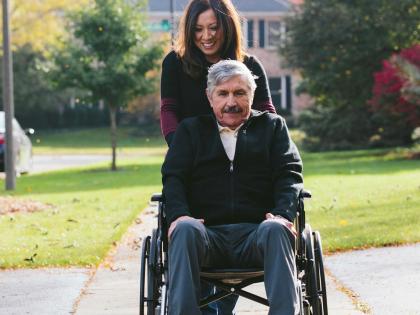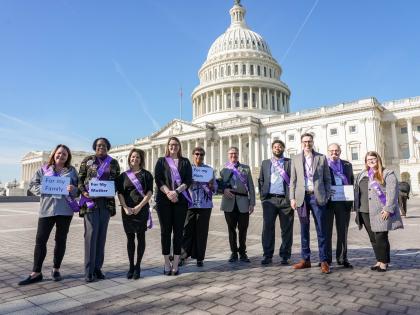New Jersey State Alzheimer’s Plan Overview

In June 2011, the New Jersey Alzheimer’s Disease Study Commission was established to study the impact and incidence of Alzheimer’s disease within the state. The Commission was tasked with making recommendations for improving and expanding services within the state to meet the needs of those affected by Alzheimer’s. It included representatives from state agencies, direct service providers, long-term care providers, community organizations, and the faith communities as well as state legislators, caregivers, and individuals living with the disease. The New Jersey Alzheimer’s Disease Study Commission Report was published in August 2016.
New Jersey 2026 Policy Priorities

Expand Access to Alzheimer’s Treatments for State Employees
Following the Food and Drug Administration’s (FDA) approval of Alzheimer’s treatments that slow the progression of the disease, state governments have a duty to ensure access to these treatments in Medicaid and other state programs, such as state employee health plans, as well as private insurance plans regulated by the state. With the number of people in New Jersey living with Alzheimer’s and other dementia growing each year, the Alzheimer’s Association is urging state lawmakers to pass legislation requiring coverage in state-regulated private insurance plans and state employee health plans to continue the progress toward greater access to treatment.

Medicaid Reimbursement for Care Planning and Cognitive Assessments
Early intervention can provide individuals living with dementia more time to plan for the future, adopt lifestyle changes, participate in clinical trials and live more fully with a higher quality of life for as long as possible. Medicare beneficiaries in New Jersey have access to a billing code that covers cognitive assessments and care planning. However, individuals under 65 relying on Medicaid do not have access to this critical service. With current promising treatments only effective in the early stages of the disease, getting an early diagnosis is more important than ever. The Alzheimer’s Association is calling on state policymakers to add CPT Code 99483 to the state Medicaid plan.

Educate Direct Care Workers on Dementia
With a growing number of New Jerseyeans admitted to nursing homes every year, dementia training for direct care workers and facility administrators is critical. To ensure nursing homes can provide quality care to residents living with Alzheimer’s and other dementia, the Alzheimer’s Association is urging state lawmakers to establish dementia-specific training requirements for licensed direct care workers. Through this action, direct care workers will learn more about the unique and complex nature of Alzheimer’s and other dementia, understand effective communication strategies, and be better equipped to provide person-centered care.

Ensure New Jersey is Prepared to Address Alzheimer’s
New Jersey is home to over 185,000 individuals living with Alzheimer’s and their 279,000 unpaid caregivers. As the population with dementia grows, a robust statewide response is needed to mitigate the impact. The Alzheimer’s Association is calling for a permanent state appropriation of $500,000 for the implementation of the State Alzheimer’s Plan and an analysis of how the state can build a stronger infrastructure that supports people living with dementia and their caregivers.
New Jersey State Advocacy Day
Join us at the New Jersey State House as we raise our voices for the fight against Alzheimer’s! This impactful day is designed to inspire our legislators to take action on key Alzheimer’s priorities that can improve the lives of New Jersey families facing dementia.
Sign Up to Learn About Advocacy Opportunities in New Jersey

Find My Chapter
Together, we’re making an impact. Find an Alzheimer’s Association chapter in your community for more ways to engage.
Contact Us
State Affairs Contact: Bruce Sisler
Phone: 732.504.2349
Email: bdsisler@alz.org
185,300
people living with Alzheimer’s in New Jersey
279,000
New Jerseyans are providing unpaid care
$2.8 Billion
Medicaid cost of caring for people living with Alzheimer’s (2025)
2,320
deaths from Alzheimer’s in 2022
23%
in hospice with a primary diagnosis of dementia
15.8%
increase of geriatricians in New Jersey needed to meet the demand in 2050
Resources to Drive Change in New Jersey
The following resources developed by AIM and the Alzheimer’s Association will help you learn more about the issues impacting people living with Alzheimer’s and their caregivers, how New Jersey policymakers are addressing these gaps, and how you can help drive change.